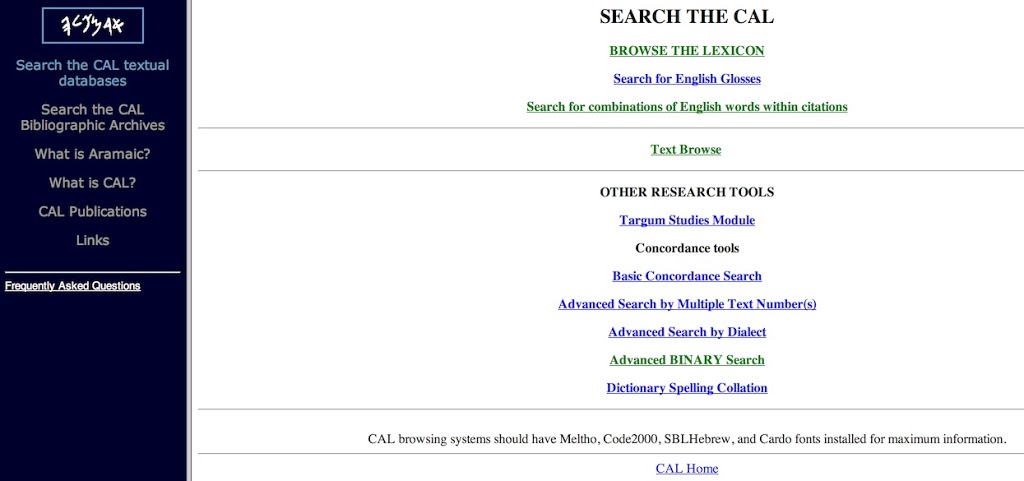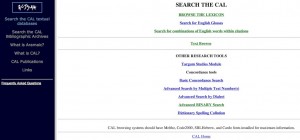A bunch of new search options are now available at the Comprehensive Aramaic Lexicon over at Hebrew Union College. Here’s the official statement:
The Advantages of the Online Comprehensive Aramaic Lexicon
Welcome to the first complete online academic lexicon of a classical Semitic language and the first dictionary of all of the classical dialects of Aramaic. As an online dictionary, the CAL itself has many advantages over the traditional printed book:
- Entries may be accessed by root, by canonical form, or by the complete form as found in texts. For example, confronted by ובמלכותה the entry can be found by searching for the form as it is, by the root “mlk” or by the lemma “mlkw.” No longer is alphabetization an issue.
- Entries may be accessed by the Aramaic word, by any English word used in the glosses, or by certain semantic fields.
- Citations within entries may be searched.
- Searching may use Roman transliteration, Unicode, Square script (Hebrew) or Syriac keyboards.
- Citations from the database are linked to the full text. Click on a citation in an entry to see it in its original context. From the context, you will find yourself in text browse mode where a click on any other word displays the appropriate lexical entry.
- A complicated entry may also be viewed without justifying citations so as to better study its overall semantic structure.
- Entries display the page numbers where a word is treated in the major previous dialect dictionaries and, more importantly, links to online displays of those digitized pages where allowed by copyright.
- There are no separate pages for abbreviations. Hover with the mouse over an unfamiliar abbreviation and a revealing “tooltip” appears.
- The CAL is live! We are constantly adding texts, adding new words, and improving entries. Active work is in progress improving our textbases and treatments of the less well-known dialects, in particular Mandaic, Samaritan, and Nabataean. All scholarly references to the CAL should thus include the date when the reference was found. We invite corrections from users!
- Although in the sense of the previous paragraph the CAL is not yet “complete,” we have decided to open the lexicon to academe: As of February, 2013, our database consists of over two million parsed words, over 30,000 individual lemmas (and 7,000 cross-references), over 60,000 glosses, and about 20,000 citations.
And here’s a list that’s currently up and most obviously new:
- Browse the Lexicon – You can now enter in the first few letters of a lemma to browse through all entires that begin with those letters (rather than using wild cards as before).
- Citation Search (“Search for combinations of English words within citations”) – You can enter up to three words in English to search for in citations (i.e. translated examples, for those not familiar with the term).
- Advanced Binary Search – Allows you to search for lemmas that are found a certain number of words way from each other. Good for finding phrases and studying idioms.
- Dictionary Collation – Although this isn’t “new” as in “brand new right now,” it’s one of the younger features that’s getting better every month. You can enter what page you’re looking at in any of the standard works listed (such as Jastrow, or Sokoloff’s DJPA, etc.) and it returns a list of each CAL lemma (i.e. dictionary entry) for that page, in order. Since traditional lemmas can be quite different between dialects and dictionaries, this is a wonderful thing to have on hand.



